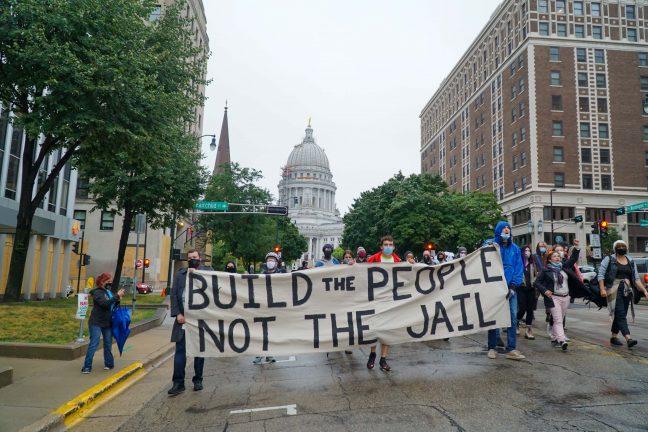Dane County moved forward with suspending the Dane County jail construction project due to a budget overrun of $20 million and to what county officials called “inhumane” conditions in the jail. The total cost of the project is $148 million.
As the Black Lives Matter movement peaked in the U.S. this summer, it brought more dialogue to countless elected officials about disproportionate incarceration rates for Black people, Indigenous people and people of color. The Dane County Board of Supervisors proved no exception, and several protests in Madison demanded less funding toward the jail project and more to community services.
Dane County Supervisor Elizabeth Doyle, District 1, who introduced Resolution 145 to halt the construction of the jail, said law enforcement agencies, including the Sheriff’s Office, were making dramatic changes to approaching sentencing to keep people out of jail in general in light of COVID-19.
“If we can rise to the occasion to address the health impacts of COVID and to keep people out of jail, why can’t we implement these same changes, or even more, to address the systemic problem of racism that’s been plaguing our community for decades?” Doyle said.
Instead of funding the construction for the jail, the County Board said in a press release it will invest $300,000 to investigate the feasibility of developing a Mental Health Triage and Restoration Center. The Center is an effort aimed at improving community mental health, continuing reforming the criminal justice system and “reducing recidivism,” which would in turn reduce the jail population, according to the press release.
Doyle said the discussion about the jail project went on for a while, but a colleague told her this conversation feels different from previous conversations because previously, it seemed like only a small set of people who were “very aware” of these issues reached out to the County Board last year when the jail issue came up to the County Board. Now, however, because there is larger awareness and support of the BLM movement, the Board is seeing more constituents reach out to say they don’t want to see the jail project move forward, Doyle said.
In previous conversations, people said they agreed to making changes in light of COVID-19 but didn’t see it as a sustainable option for the long term, Doyle said.
“It really has been great to see the evolution of these conversations and how people who were saying ‘No’ at the onset of these conversations have now come around to say, ‘Yes, we need to make changes,’” Doyle said.
County Board Chair Analiese Eicher, District 3, said the COVID-19 pandemic brought forward conversations about global system changes. In addition to replacing the current “outdated” and “dangerous” jail facilities in the county, Eicher said every actor in the criminal justice system needs to start thinking about how their actions, policies and financial expenditure impact the system as a whole.
According to Eicher, the county needs to have conversations about reform and how they can get to a place where they don’t need a “punitive” system, as well as what the county is doing in the meantime to make sure those in jail can be treated like they are human. Eicher said society is years — perhaps decades — away from no longer using a punitive system.
“I think the question for us is, yes, COVID has changed some things, and folks are finally recognizing and realizing that we need [change], but how are we going to be doing this in a way that is smart and isn’t done in a way that disrupts the system in a negative way and ends up with more people in a system that doesn’t work,” Eicher said.
According to Eicher, Wisconsin has “incredible” racial disparities, particularly in its criminal justice system. The current people in the jail, Eicher said, are not being treated in a rehabilitative way, and the drinking, air and building safety conditions are “absolutely unacceptable.”
In addition to problems with the infrastructure, Doyle said individuals having mental health crises in the jail are sent to solitary confinement, which exacerbates their issues instead of providing support and resources to them.
Dane County’s Criminal Justice Council Research and Innovation team, which is composed of researchers and various leaders, has close ties with the University of Wisconsin System and works with various UW departments on research and information and data sharing. Eicher said she is looking forward to continue that collaboration to bring new reforms in Dane County.
UW student and District 8 Supervisor Elena Haasl said they fail to see the purpose in a jail project which invests hundreds of millions of dollars into a broken prison system.
Haasl said though the jail construction was halted, it could be continued in the future. Haasl believes Dane County needs to look at options other than incarceration since it is not an equitable way to treat community members.
By investing in the Mental Health Triage and Restoration Center instead of the jail, Doyle said Dane County will be able to fill in some financial losses it faced due to the COVID-19 pandemic. In addition, the Center will provide mental health resources as an alternative to jail.
Many people end up in jail due to either a mental health emergency or distress, and often their medications are taken away in jail, Doyle said.
“There’s all sorts of things that happen that really exacerbate an already not-ideal situation, and jail [is] not the appropriate space for these folks — they should be connected with help and resources, not punished,” Doyle said.


